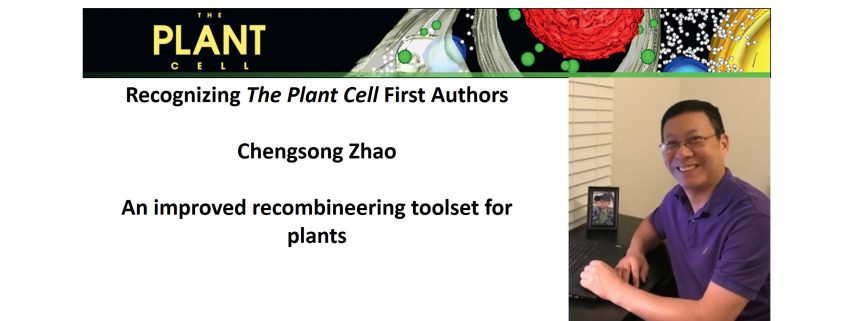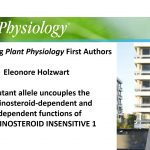Recognizing Plant Cell first authors: Chengsong Zhao
Chengsong Zhao, co-first author of An improved recombineering toolset for plants
Current Position: Research Scholar in the Alonso-Stepanova laboratory, Department of Plant and Microbial Biology, Program in Genetics, North Carolina State University, Raleigh, NC, USA
Education: Ph.D. in Horticulture from Virginia Tech
Non-scientific Interests: Driving, traveling, archeology, science fiction and fantasy novels/movies, and astronomy
Brief bio: I am fascinated by how plants adapt to their environment via changes in gene expression. I joined the laboratory of Dr. Eric P. Beers at Virginia Tech (Blacksburg, Virginia) for my Ph.D to work on the molecular mechanisms underlying the terminal transition to xylem cell differentiation. I identified a key negative regulator of xylem formation in angiosperms, XYLEM NAC DOMAIN 1 (XND1). The XND1 protein possess a highly conserved C-terminal region also present in human adenovirus E1A and animal E2F transcription factor and known to interact with the cell cycle and differentiation regulator RETINOBLASTOMA-RELATED (RBR). Recently, XND1 was also identified as a negative regulator of Arabidopsis root hydraulic conductivity. Given that XND1 is angiosperm-specific, mediates xylem cell size, and negatively regulates root hydraulic conductivity, it is possible that XND1-like proteins have contributed to the great explosion of flowering plants during the Cretaceous Period. After completing my work with Dr. Beers, I joined the laboratory of Dr. Guillaume Pilot at Virginia Tech where I characterized the UmamiT family of transporters in Arabidopsis and cloned the first plant shikimate transporter. Two years ago, I moved to Raleigh to join the Alonso-Stepanova laboratory at North Carolina State University. My current work involves developing programmable CRISPR-based genetic logic gates, adapting the lambda-red-based homologous recombination system for eukaryotic cells, and identifying signal integration hubs and cis-regulatory elements of translation in response to plant hormones in tomato.




